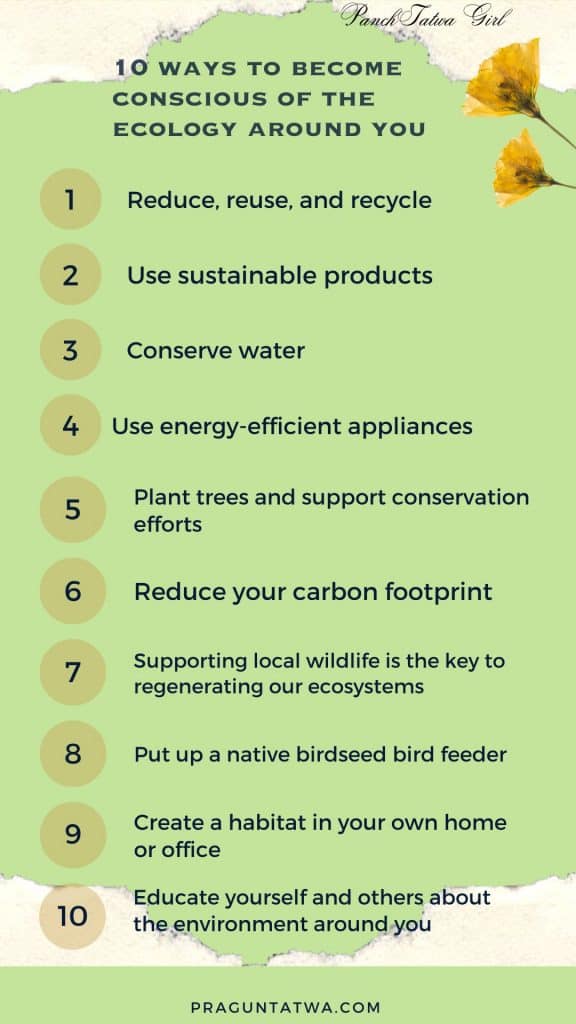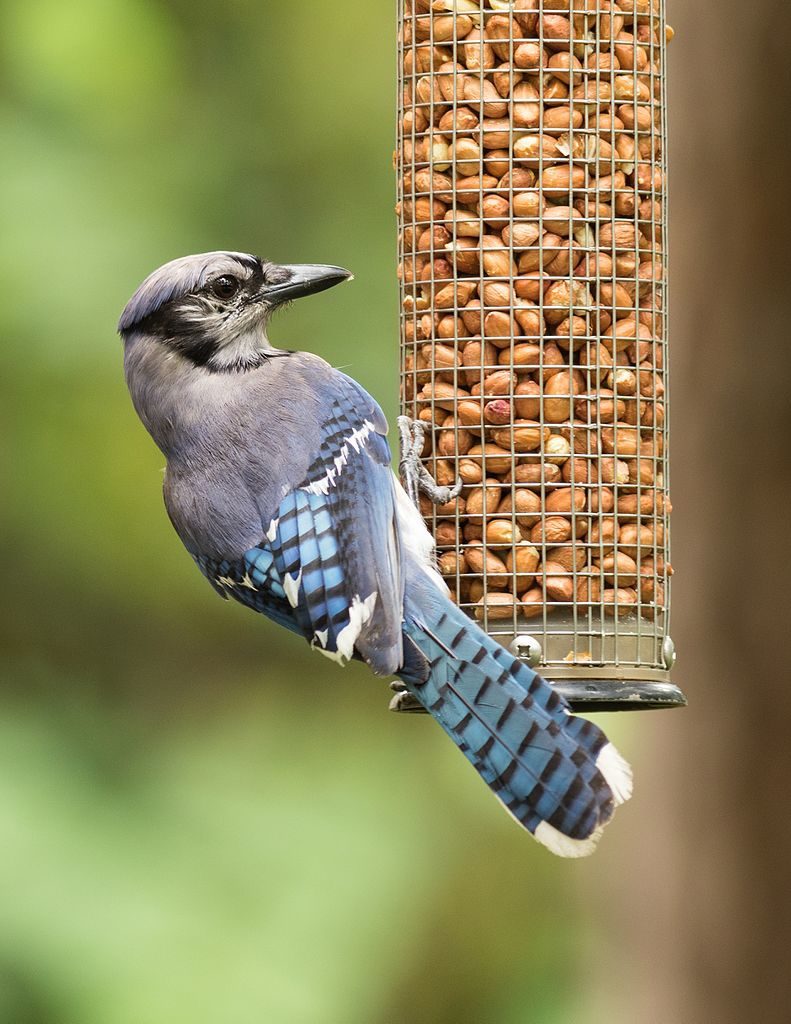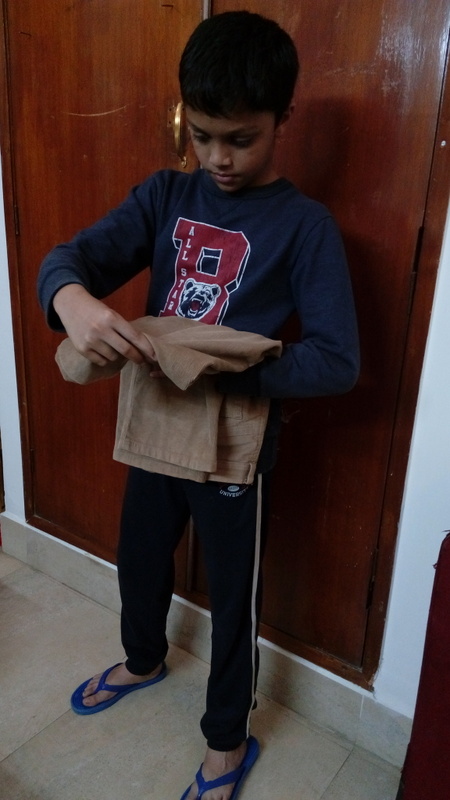Be conscious of the ecology around you

The Earth is a beautiful place full of resources and life. We need to respect our environment. Many people don’t care to think about the environment or ecology because they feel that they don’t have the power to make a difference. But, if you want to take control, there are simple steps you can take in your everyday life that will help the environment. Being conscious of ecology means being aware of the natural environment around you and taking steps to protect it. Sharing some ways to be more conscious of the ecology around you:
Reduce, reuse, and recycle:
This is a well-known phrase that encourages people to reduce their consumption of resources, reuse items as much as possible, and recycle what cannot be reused. By this, we can adopt more environmentally-friendly behaviors.
- Reduce: This refers to the act of reducing the amount of waste we produce. It can be achieved by consuming less, using products that are designed to last longer, and avoiding disposable items that are used once and then discarded.
- Reuse: This involves finding new ways to use items that might otherwise be thrown away. For example, you can reuse containers for storage, repurpose old clothing into rags, or donate unwanted items to charity.
- Recycle: Recycling involves processing materials that would otherwise be discarded and turning them into new products. Common materials that can be recycled include glass, plastic, paper, and metal.
By practicing the “reduce, reuse, recycle” mantra, we can reduce the amount of waste we produce, conserve resources, and reduce the amount of pollution we create. This, in turn, can help to protect the environment and promote a more sustainable future.
- Use sustainable products
- Choose products made from sustainable materials: Look for products made from renewable materials that can be grown or harvested without damaging the environment. Examples include bamboo, hemp, organic cotton, and recycled paper.
- Use reusable bags and containers: Avoid using single-use plastics by carrying a reusable shopping bag, water bottle, and food container with you.
- Choose energy-efficient appliances: When it’s time to replace old appliances, look for energy-efficient models that use less energy and are designed to last longer.
- Buy products with minimal packaging: Avoid products that are over-packaged or wrapped in non-recyclable materials.
- Use non-toxic cleaning products: Many cleaning products contain harmful chemicals that can harm the environment. Look for non-toxic cleaning products that are safe for both you and the environment.
3. Conserve water
- Fix leaks promptly: Even a small leak can waste a significant amount of water over time. Regularly check your faucets, pipes, and toilets for leaks, and fix any problems promptly.
- Take shorter showers: Taking shorter showers can save a significant amount of water. Consider installing a low-flow showerhead to reduce the amount of water used while showering.
- Turn off the tap: Turn off the tap while brushing your teeth or shaving, and don’t let the water run unnecessarily.
- Use water-efficient appliances: Look for appliances that are designed to use less water, such as dishwashers and washing machines.
- Use a broom instead of a hose: Use a broom or leaf blower to clean driveways and sidewalks instead of a hose.
- Collect rainwater: Collect rainwater in a barrel or other container and use it to water your plants or garden.
- Water your lawn and plants early in the morning: Watering your lawn and plants early in the morning when it’s cooler can reduce evaporation and help the water penetrate the soil more effectively.
4. Use energy-efficient appliances:
- Look for the Energy Star label: Energy Star is a government-backed program that helps consumers identify energy-efficient appliances. Look for the Energy Star label when shopping for new appliances.
- Choose the right size: Choose an appliance that is the right size for your needs. An oversized appliance will waste energy and money.
- Use the appliance efficiently: Follow the manufacturer’s instructions for using the appliance efficiently. For example, only run the dishwasher when it’s full, and wash clothes in cold water instead of hot water.
- Maintain the appliance: Regular maintenance can help your appliances run more efficiently. Keep your appliances clean and in good repair.
- Consider replacing old appliances: If your appliances are more than 10 years old, it may be time to replace them with newer, more energy-efficient models.
5. Plant trees and support conservation efforts:
- Trees help to clean the air and provide habitat for animals. You can also support conservation efforts by donating to organizations that work to protect the environment. Try and Plant native plants. The average person has a carbon footprint of about 20,000 pounds in their lifetime. This means that if everyone on Earth consumed as much as the average person, it would take 42 Earths to support them all. That’s a lot of Earths! When deciding what you can do to save the ecosystems in your area, the answer is simple: Grow native plants!
- Supporting local wildlife is the key to regenerating our ecosystems. Look into the native wildflowers, trees, shrubs, and vines suitable to your environment, to create habitat in your own home or office. Ecology is an area you might want to start thinking more about. What can you do to reduce your ecological impact? One way you can reduce your ecological impact is by planting native plants. Native plants will grow and reproduce in their natural habitat. This type of plant sustains and supports the land and its surrounding ecosystem. The environment surrounding natives will be better off because the native plants will create a protective barrier against invasive species that could outcompete them for resources like water and nutrients.
6. Reduce your carbon footprint:
Reduce your carbon footprint by driving less, using public transportation, walking, or biking.
- Use natural materials: Choose natural materials for your furnishings and decor, such as bamboo or reclaimed wood.
- Create a compost pile: Create a compost pile to reduce waste and provide nutrients for your plants.
7. Supporting local wildlife is the key to regenerating our ecosystems
- Living in harmony with nature is an essential part of a healthy lifestyle. From eating sustainably to conserving resources, it pays to be aware of the impact you have on your surroundings. Supporting local wildlife is the key to regenerating our ecosystems.
- Choose the right plants: Choose plants that are native to your area and that provide food and shelter for local wildlife. Examples include milkweed for monarch butterflies and sunflowers for birds.
8. Put up a native birdseed bird feeder
Install bird feeders and birdhouses to provide food and shelter for birds. If you want to attract these little birds to your yard, set up a native birdseed bird feeder with a mixture of sunflower seeds, safflower seeds, and peanuts. The peanut will give the birds an added boost in protein which helps them grow faster and be more productive.
Bringing nature closer to work or home is easy with a bird feeder. Make sure to purchase only native birdseed as a way to support the beautiful birds in your neighborhood.
9. Create a habitat in your own home or office
You could start by creating an eco-friendly habitat in your own home or office. We all know that we should care for the environment, but it can be difficult to find time to do anything about it. The solution? Make your own small changes! One easy way to live more sustainably is to create a ‘green’ space in your house or office. You can lower your carbon footprint by doing this one simple thing!
- Provide water: Place a shallow dish of water outside your home or office to provide a source of water for birds and other wildlife.
10. Educate yourself and others about the environment around you:
Learn more about the environment and the impact of human activities on it. Share your knowledge with others and encourage them to make more environmentally-friendly choices. We can help this planet, by being conscious of the ecology around us and taking steps to protect the environment. We can help to ensure a more sustainable future for ourselves and future generations. It’s important to remember that small changes can make a big difference, so start by making a few small changes and gradually work your way towards a more sustainable lifestyle. By conserving water, saving energy, and being conscious of the ecology around you, we can help reduce our environmental footprint and ensure that we have enough water for future generations.

From my Green Bag –
Support, share, and try to bring that one change in your life toward a greener tomorrow. Do check out my other posts on Sustainable Conscious living, a step towards a healthier planet. Which covers easy ways to save water, save energy, conservation at the home level, a little bit to heal Mother Earth, and much more. Listen to some wonderful people in eco-friendly talks in episodes of Green Talks.
Looking for an Eco-friendly Life? Want to change a habit towards more sustainable living? Then join me in this mission to raise awareness and adopt more sustainable practices. Find 30 ways to Earth-friendly living And Reasons to refuse plastic bags.
I’m just a simple eco-conscious human requesting everyone to love this planet and put in that little effort toward a better and greener tomorrow. Learning to be more environmentally friendly is easier than you think. You don’t have to jump in by changing everything, start small to make the changes more sustainable and a part of your normal life.









Recent Comments